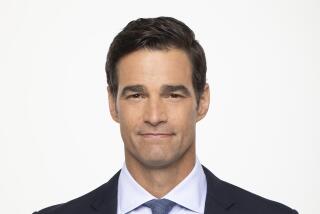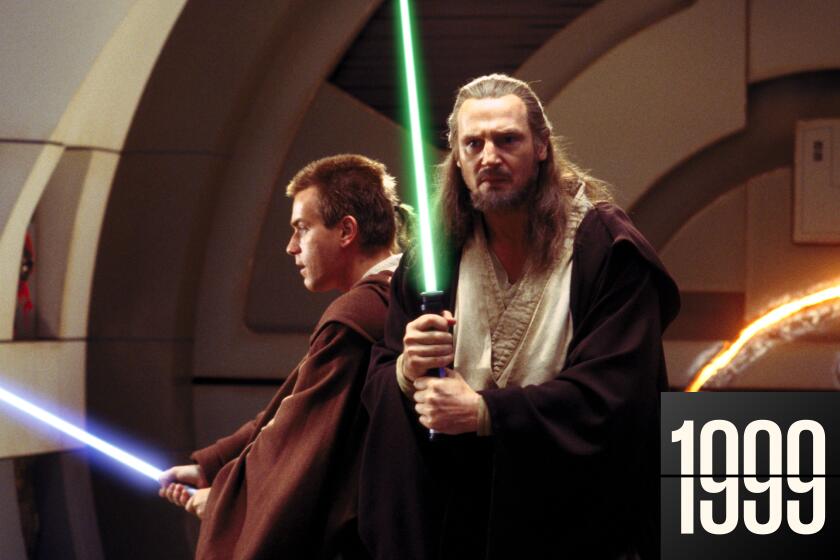Slump creates drama at NBC
NBC’s sweeping shake-up of its entertainment division last week highlights the deep problems it and other networks face in continuing to produce high-quality shows as advertisers slash spending and viewers find alternate ways to watch TV.
The General Electric Co.-owned network, which has seen its ratings plunge 14% this season, plans to announce this week that it will merge its two programming groups -- one at the NBC network and the other at its television production studio -- into one unit.
The restructuring, which could save the company millions of dollars a year in overhead, comes as the TV industry braces for advertisers to dramatically scale back their purchase of commercial time next year, pressuring revenues and eroding profit margins.
“This is the most fragile advertising market that I’ve ever seen in my 25 years as a media and entertainment analyst,” said Larry Gerbrandt, head of Media Valuation Partners in Beverly Hills. “Every major company is looking at how to cut costs, cut staffing and cut advertising. This is not a good time to be the No. 4 network and not have any new hit shows on the air.”
NBC’s move could signal a shift in how television shows, which underpin the Hollywood economy, are bought and sold. NBC, one of the largest producers of programs for all the networks, could decide to retrench by producing shows only for one of the channels the company already owns -- leading to fewer jobs for actors, writers and scores of people who work “below the line” making TV programs.
It is not unusual in the TV industry for rivals to team up and produce shows, in effect helping a competitor make money. Although a particular show may not fit well on one network’s schedule, it can often prosper on another, which generates income for both.
For example, NBC has been producing the comedy “Worst Week” for CBS, and CBS produces the drama “Medium” for NBC. The most profitable show that NBC Universal owns is the medical drama “House,” which stars Hugh Laurie and runs on Fox.
Fox retains the advertising revenue, but NBC is paid a license fee by Fox and keeps the revenue from sales to foreign networks.
On Friday, NBC forced out three top programming deputies -- Katherine Pope, Teri Weinberg and Craig Plestis -- after the network’s dismal start to the new fall season. The company’s biggest prime-time bets, including “Knight Rider,” “My Own Worst Enemy” and “Crusoe,” flopped and its one new sitcom, “Kath & Kim,” has been a ratings laggard.
Pope, who frequently clashed with her bosses, NBC Universal Chief Executive Jeff Zucker and NBC Entertainment co-Chairman Ben Silverman, was until Friday the president of the television studio. Pope had fiercely resisted plans to merge the studio operations with the network, according to people familiar with the situation.
Weinberg, who followed Silverman from his production company to the network in June 2007, served as his deputy in charge of programming even though she had no network experience. Weinberg failed to gain the support of her staff in part because she lobbied for shows produced by her live-in boyfriend.
Plestis was in charge of game and reality shows, although several of his initiatives, such as “Clash of the Choirs” and “America’s Got Talent,” sputtered in the ratings. He will be replaced by a former BBC America executive, Paul Telegdy, who helped develop ABC’s hit show “Dancing With the Stars.” Telegdy starts at NBC Jan. 5.
The restructuring is part of $500 million in cutbacks ordered by NBC Universal in response to what the company called “new economic realities.” Among the measures, producers of NBC programs have been told to cut their production budgets by 5%.
NBC is not alone in its troubles.
Prime-time ratings are down this season for all the major networks: NBC, CBS, ABC and Fox. Some of the losses can be attributed to technology. Nearly 30% of all homes with televisions now have digital video recorders, so viewers can record and watch shows at different times. Those viewers are not fully counted in the audience measured by Nielsen that networks sell to advertisers.
In addition, broadcasters are still feeling the pain of the writers strike early this year. Although the strike produced a short-term financial gain for the networks because companies did not have to incur large costs producing shows, the strike led to longer-term problems. The networks had less time to prepare for the fall season, and some of the shows rushed onto the air -- including NBC’s new series -- have bombed.
Networks have been slower than usual to cancel low-performing programs, in part because they don’t have replacement shows ready. There is another, more complicated, reason: Networks don’t want to give advertisers the opportunity to cancel the orders for commercial time they placed last summer, during the so-called upfront market.
“There are perhaps a dozen or more other shows that are on the brink of cancellation due to poor ratings yet the networks have held back,” Brad Adgate, senior vice president for research at ad-buying firm Horizon Media, wrote in a report last week. “With an uncertain economy in 2009, advertisers will be able to exercise their option to pull out of their upfront advertising commitment on any show that is canceled.”
But unlike the other networks, NBC continues to struggle with management turmoil.
The company plans to bring back an experienced programming executive, Angela Bromstad, to manage NBC’s studio and network program development. Bromstad, a former head of the company’s television studio, probably will take over the role that many expected Silverman to fill when he joined NBC last year, after making a name for himself as an independent producer.
However, once in the job, Silverman showed little interest in the nuts and bolts of programming and delegated much of the responsibility to Weinberg.
NBC’s touted plan to largely do away with the pilot-development process might have back-fired too. None of the shows that NBC ordered for series have been ratings winners, including the $4-million-an-episode “My Own Worst Enemy.” The show, starring Christian Slater, has already been canceled.
“People say pilots are expensive and a waste of money, but 75% of the pilots that do well in the testing [phase] go on to become solid shows,” said Shari Anne Brill, senior vice president and director of programming for ad-buying firm Carat.
“Networks need to make that investment to see what works.”
--
More to Read
The biggest entertainment stories
Get our big stories about Hollywood, film, television, music, arts, culture and more right in your inbox as soon as they publish.
You may occasionally receive promotional content from the Los Angeles Times.







